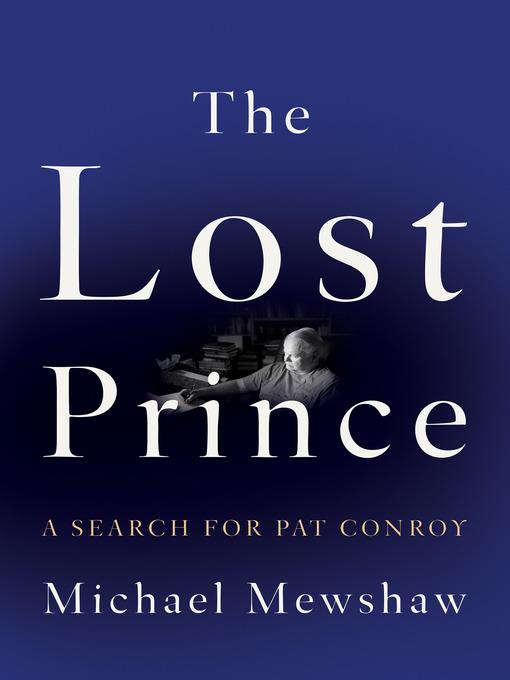
The Lost Prince
A Search for Pat Conroy
کتاب های مرتبط
- اطلاعات
- نقد و بررسی
- دیدگاه کاربران
نقد و بررسی

October 22, 2018
At heart, this fascinating memoir from Mewshaw (Sympathy for the Devil) of his friendship with the late novelist Pat Conroy is a love story. The two men found in each other a confidant and sympathetic soul with similar fears and scars born of peripatetic military family life, strict Catholic upbringings, and abusive parents, as well as a shared love of basketball and books. They met in Rome, as part of the American expatriate community in the 1980s, forming a relationship Mewshaw describes as intense, loving, and openhearted. However, he also exposes a dark underbelly to Conroy’s “hail fellow, well met” nature: his excessive drinking, his anger with one of his daughters (to whom Mewshaw was godfather) after his divorce from her mother, his tendency toward self-mythologizing, and his insecurities. Mewshaw, meanwhile, had his own personal and professional setbacks. At Mewshaw’s side through it all was his friend—until, during Conroy’s divorce, Conroy perceived Mewshaw as taking his wife’s side and broke off ties. Near the end of his life, though, the two tentatively reconnected, and Conroy urged Mewshaw to tell the story of their friendship. What could have been a maudlin, self-indulgent memory piece instead proves an honest, eminently readable look at the fraught but rewarding bond between two writers.

December 1, 2018
A very personal memoir about the acclaimed Southern writer.Novelist and journalist Mewshaw's (Sympathy for the Devil: Four Decades of Friendship with GoreVidal, 2015, etc.) portrait of his close friend Pat Conroy (1945-2016) is breezy, sympathetic, and affectionate. Conroy, he writes, was a "manic talker and tireless narrator of stories, some much too tall to be true, some so searingly true they left scars on his listeners," and he calls Conroy's works "the prose equivalent of lacerating confessional poetry." Their friendship extended through the 1980s and '90s when Conroy was working on Prince of Tides and Beach Music. It was Conroy who later suggested Mewshaw write about him. When Conroy first met Mewshaw in Rome in 1981, he told him he was "desperate for a friend." Mewshaw was an amiable writer who was also a good listener, which Conroy needed. Mewshaw then "devoured" The Water Is Wide and The Great Santini. The latter comes up quite a bit here, not just because it was so well-done and became a popular movie, but because Mewshaw, as he got closer to Conroy, became increasingly suspicious about the veracity of Conroy's descriptions of his relationships with his "ruthless" Marine father and submissive mother. As Conroy once told Mewshaw, "I'm the most falsely open person you'll ever meet." Their families also became close, and Mewshaw writes extensively about these relationships--sometimes too much. Conroy "wore me out," Mewshaw writes, "and he worried me." Their friendship fell apart over family issues. The book is full of wonderful anecdotes and vignettes about fellow writers William Styron, Mark Helprin, Nora Ephron, and Gore Vidal, who told Mewshaw that Conroy's "novels about dysfunctional families indicate just how fucked-up our nuclear units have become." Mewshaw also chronicles Conroy's alcoholism and the devastating effect it had on his writing and health.A fiercely honest and melancholy portrait of a "protean figure who cast a large shifting shadow."
COPYRIGHT(2018) Kirkus Reviews, ALL RIGHTS RESERVED.

Starred review from January 1, 2019
The late Pat Conroy (who died in 2016) ranked highly in popular appeal as the author of such well-loved novels as The Great Santini (1976) and The Prince of Tides (1986). Mewshaw, the writer of this resonantly poignant memoir, was Conroy's best friend for many years, and it is the remembrance of his Conroy experiences that forms the basis of this charming autobiographical story. Much of the two friends' time spent together took place in Rome. Both Conroy and Mewshaw, also a fiction writer, spent periodic, often simultaneous lengths of time there with their families to get away from the usual and enjoy new surroundings that stimulated creativity and productivity. Conroy, we quickly come to see, was a complicated, egocentric, generous-�when-he-felt-like-it personality; and although Mewshaw stands forthrightly as an estimable personality, not taking refuge in the shadow of his more-famous friend, the book's lasting value lies in Mewshaw's letting Conroy's vibrancy, whether striking the reader as a positive or negative factor, shine through.(Reprinted with permission of Booklist, copyright 2019, American Library Association.)

























دیدگاه کاربران